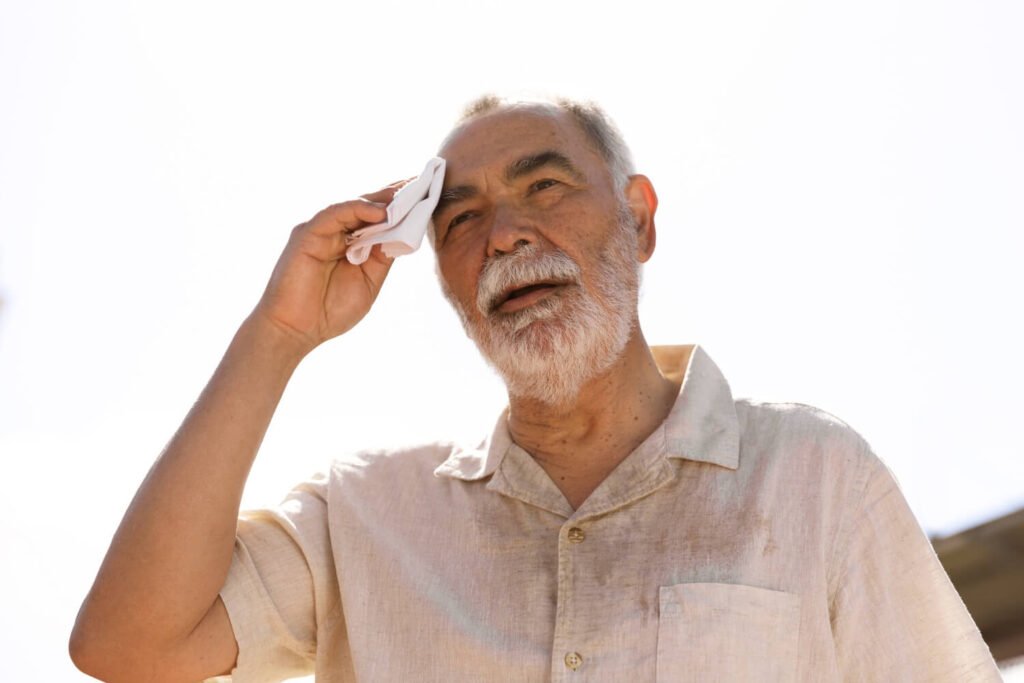Hyperhidrosis or excessive sweating?
Sweating is a natural response of the body. Sweating can be produced by high temperatures, effort, stress, worry, fear, rage, and so on. When the body’s temperature rises due to heat, it sweats to maintain its usual level. Some people, however, sweat excessively, which is known as hyperhidrosis, and this can hurt their quality of life. In this post, I will discuss the causes, hazards, benefits, prevention, and treatment of hyperhidrosis, or excessive sweating.
When would you say you have hyperhidrosis, or excessive sweating?
Excessive sweating occurs when there is more sweating than expected based on the surrounding temperature, level of physical exertion, or mental stress. Excessive sweating can disrupt daily activities and cause embarrassment in social situations. Hyperhidrosis can occur all over the body or in certain areas such as the palms of the hands, soles of the feet, underarms, or face.
What can be the causes of excessive sweating?
Hyperhidrosis can be divided into two types:
1.primary hyperhidrosis and
2.Secondary hyperhidrosis
1. Primary hyperhidrosis
Excessive temperatures typically produce primary hyperhidrosis, which has no clinical problems or diseases and occurs in specific areas such as the palms of the hands, soles of the feet, face, and underarms. The actual etiology of primary hyperhidrosis is unknown, however it is believed to be caused by excessive sweat gland activity. In certain circumstances, it may be inherited.
2. Secondary Hyperhidrosis
Secondary hyperhidrosis is typically caused by an illness or another medical condition. One such clinical disorder is acromegaly. It is an uncommon but deadly condition caused by a tumor in the pituitary gland that secretes excessive growth hormone. This causes overgrowth in particular regions of the human body, including the hands, feet, forehead, jaw, and nose. Other causes include
- Diabetes,
- Hypoglycemia,
- Hypothyroidism,
- Leukemia,
- Malaria,
- Infections,
- some antidepressants and beta-blockers,
- menopause,
- neurological illnesses,
- pheochromocytoma (rare adrenal gland tumor),
- TB,
- lymphoma.
What are the dangers of excessive sweating?
- Excessive sweating can cause physical discomfort, psychological misery, and social shame.
- You may experience poor self-esteem as a result of obvious sweat stains on your clothing and bad body odor.
- It might make you lose confidence.
- Sweating excessively may have an impact on both personal and professional relationships.
- It might limit your social relationships and disrupt your daily tasks.
- Persistent sweating can cause skin infections and other issues.
What are the possible benefits of high sweating?
Although excessive sweating might present several issues, there are certain health benefits to sweating
- Sweating helps to cool the skin and regulate body temperature.
- It aids in the elimination of toxins from the body and strengthens the immune system.
- Sweating while activity keeps the body from overheating.
- Sweating helps exfoliate the skin and removes toxins from the body.
Best Ways to get rid of excessive sweating
Although it may not always be able to prevent excessive sweating, implementing some modifications and tactics in your daily life might help you deal with this issue.
Maintain cleanliness
Bathing regularly, using a high-quality deodorant, and wearing clean, loose clothing can all assist in eliminating perspiration odor.
Dress appropriately
Choose loose cotton, linen, or natural fiber clothes that allow for optimum ventilation and moisture absorption.
Control stress.
Stress and worry can create excessive perspiration, therefore using mental relaxation techniques like deep breathing exercises, yoga, or meditation will help.
Avoid meals that promote excessive perspiration
Spicy meals, coffee, alcohol, and smoking are all possible causes for excessive perspiration. Avoid them.
Stay hydrated
Drink plenty of water and liquids. They contribute to body temperature regulation and general wellness.
Maintain a healthy body weight
Obesity can cause excessive sweating. A nutritious diet and regular exercise can help you keep your weight under control.
Suppose you do not get rid of hyperhidrosis or excessive sweating even after changing your lifestyle. In that case, you should find out if there is any medical condition or disease and consult a doctor if necessary.

